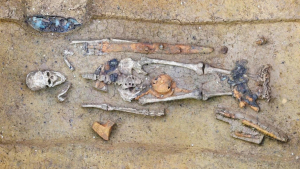Incorporating a joke into the title of a scientific paper could pay off: such research may be cited more frequently in other scientific publications than studies with less witty titles. This is the conclusion reached by researchers whose study has so far only been published on the preprint server "bioRxiv" and has not yet been reviewed by experts. In advance, however, some colleagues are not convinced that funny titles would lead to more references in specialist articles. In their view, the evidence cited is not sufficiently reliable.
Every now and then jokes appear in scientific works. "One place where humor is often used is the headline – but there is very little literature on whether this is a good idea at all," says study author Stephen Heard from the University of New Brunswick in Fredericton, Canada.
In order to find out whether a funny title would increase the readership of an article and the number of references, the evolutionary ecologist and his team asked test participants to evaluate the headings of 2439 specialist articles after how strange they are. The articles submitted appeared in nine magazines for ecology and evolution in 2000 and 2001. The participants chose from a seven -stage scale from zero ("completely serious" title) to six ("extremely funny"). The research group then examined whether there was a connection between the humor values and the number of quotations - they noted both references from other experts and those on their own work.
The conclusion: Studies with funny titles are not cited as often as their counterparts with serious headlines. However, authors themselves cited their own works, which they titled rather funny, less frequently. Heard's team concluded that if scientists consider their own study to be less important, they are more likely to give it a funny title. "We assume that authors who don't refer to their own work don't think it's that important," says Heard.
But the researchers around Heard also found that articles with funny titles are actually quoted more frequently by others than those with serious headlines. For example, studies whose titles the test participants rated with six points on the humor scale were cited on average almost twice as often as those whose titles received only four comedy points.
Is funny really better?
However, some researchers do not agree with these results. In her opinion, the number of self-cited papers may not be a good indicator to measure the importance of a research paper. Citing oneself could draw more attention to studies that are otherwise rarely taken up, says Michael Schreiber. The theoretical physicist from Chemnitz University of Technology conducts research in the field of bibliometrics. "That would mean that unimportant works would receive more self-citations," says Schreiber.
According to Stefanie Haustein, who works on science communication and bibliometry at the University of Ottawa, there are actually many reasons for researchers to refer to their own works. And often scientists would list their entire portfolio on a certain topic, explains Haustein, not only the most important works: because sponsors and universities usually measure the impact with the number of cited studies. And showing yourself could increase the citation rate.
According to Vincent Traag from the University of Leiden, it would be better to ask for a group of experts to evaluate the relevance of a scientific article. House -in -law also adds that other indicators are more suitable as a benchmark, for example how often articles have been called or downloaded.
As Haustein and her team were able to show, works with funny headlines receive significantly more attention on social media and are often shared there. However, there is only a weak correlation between Twitter and the number of referrals. So a funny title may have no influence on whether a paper is cited, "but it's interesting to see how researchers or even the public deal with scientific texts," says Haustein. In any case, I think the idea [of Heard's study] is great."



















